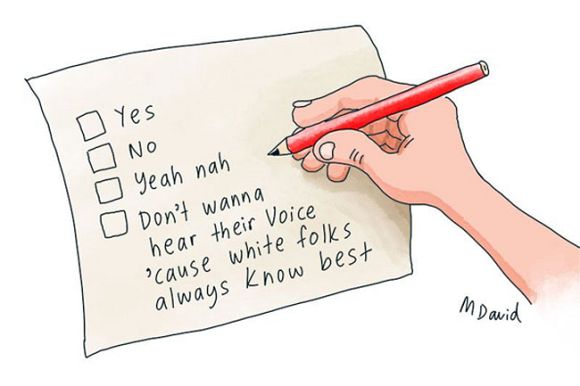Denying Indigenous Australians a Voice to Parliament has exposed an absence of compassion that has set our nation backwards in time, writes Dermot Daley.
A MONTH AFTER Australia’s Referendum on providing a Voice to Parliament for the First Nations people, I am finding that I am still numbed and hurt. It saddens me that we, collectively, are a racist nation. People I know and meet daily in my community have voted that they want the status quo to continue. It wasn’t even close — the “No” vote was overwhelming.
Many people were swayed by the malevolent opinions of overpaid toadies and the yapping lap-dogs of the corporate media. Some people were influenced by the divisive stance of Elder-abusing mercenary individuals like Senator Jacinta Price and Warren Mundine, both of whom attach an Indigenous name to their signature (like a shop-bought diploma) when in effect, they fit that disparaging global and historic term for someone who is Brown on the outside and White in the middle.
Some people were taken in by the artful ‘If you don’t know, vote No’ campaign. And far too many people took sides along the red and blue party lines, failing to notice that the leader of the blue team was acting purely on political self-interest at the expense of truth.
A few people still claim that they thought deeply about the matter and concluded that one group in society does not deserve special consideration above anyone else. Oddly, these self-informed voters do not seem to mind that many purpose-built think tanks and international corporations have a special voice to politicians through quisling lobbyists, and greased by generous gifts to the parties, thereby overriding any semblance of traditional people-serving democracy.
But what is this “status quo” demanded by Australian voters in the Referendum?
History is often a record of what we have failed to learn from history.
Lt James Cook (he was a lieutenant and promoted later) was a masterful navigator who learned from the Portuguese (who learned from the Chinese) about astro-navigation in the southern oceans. He had also learned that citrus can help control scurvy. He was under instruction from London that if he encountered natives in his travels he was to treat them respectfully.
Cook’s wealthy scientist passenger was the botanist Joseph Banks, to whom the Indigenous Australians were a mere nuisance. We can only wonder how differently history may have played out if the passenger on the HMS Endeavour had been an anthropologist.
Then came the First Fleet, followed by more and more free settlers — mostly adventurous types who weren’t going to let a few obstacles like “uncivilised primitives” get in their way. These “men of action” explored the territory, taking what they wanted, some taking disproportionate revenge at feeble resistance. Decades later, gold fever struck and the colonial population exploded.
By the time of Federation, Australia was a Whites-only society. Some sanctimonious persons had the thought to place First Nations people under protection on reserves, rounding up the offspring of any Blacks who had cohabited with Whites and sending them to live with White families. In one form or another, this discrimination persisted and is still evident in the incarceration rates of Indigenous Australians.
In the meantime, the world was changing. Wars had caused the displacement of masses of people and many sought safety and refuge in Australia. With each wave of migration, the once proud First Nations people were further dispossessed of traditional land and forced onto the tatty fringes of society. It is said that at a first meeting, a White man might ask another White man, “Where did you go to school?” while a Blackfella will ask another Blackfella, “Where are you from?”
To the Indigenous, country is the spiritual home, it is the law/lore, it is the past and the future. To be forced off one’s land is to be stripped of familiarity and belonging.
The belittlement of Indigenous culture persisted into the 21st Century with the Howard Government’s “Intervention” where patronising goodwill backed up with military force and unchecked waste of public money further disenfranchised a race of people for being “not one of us”.
Under a “Voice”, as advocated by a gathering of respected Indigenous Elders from right across Australia after iterations of long deliberation, Howard’s Intervention would not have occurred. Nor would the unchecked pillaging of land such as the destruction at Juukan Gorge have been permitted.
The Voice was only intended to give First Nations people a say in affairs that concern them. It did not aspire to influence government policy in the way that the Australian public blithely accepts the intrusion of U.S. and British diplomacy in our domestic affairs, or the profit motives of corporate pirates intent on channelling of public commonwealth into private ownership.
The Elders who produced the Uluru Statement from the Heart wanted to make a better future for their descendants and they wanted to hand over their gift to new leadership.
The lie that there were no inhabitants in Terra Australis at the time of settlement is fully and finally exposed. The landscape has revealed its secrets, the artefacts are evidence, and the living descendants of the tribes of First Nations are seeking recognition and justice.
And thus, it is now a matter of record that Australia is a racist country.
We have gone backwards in time, and backward in emotional intelligence.
Dermot Daley is a fourth-generation Australian living in Victoria, who is now retired from construction project management.
Related Articles
- No good reason to vote 'No'
- EDITORIAL: The Voice looks at the big picture: It's time to listen and act
- Voice to Parliament a chance to minimise Indigenous child imprisonment
- Voice vital to the rights of First Nations people
- White greed and corruption motivations for Indigenous Voice
 This work is licensed under a Creative Commons Attribution-NonCommercial-NoDerivs 3.0 Australia License
This work is licensed under a Creative Commons Attribution-NonCommercial-NoDerivs 3.0 Australia License
Support independent journalism Subscribe to IA.














